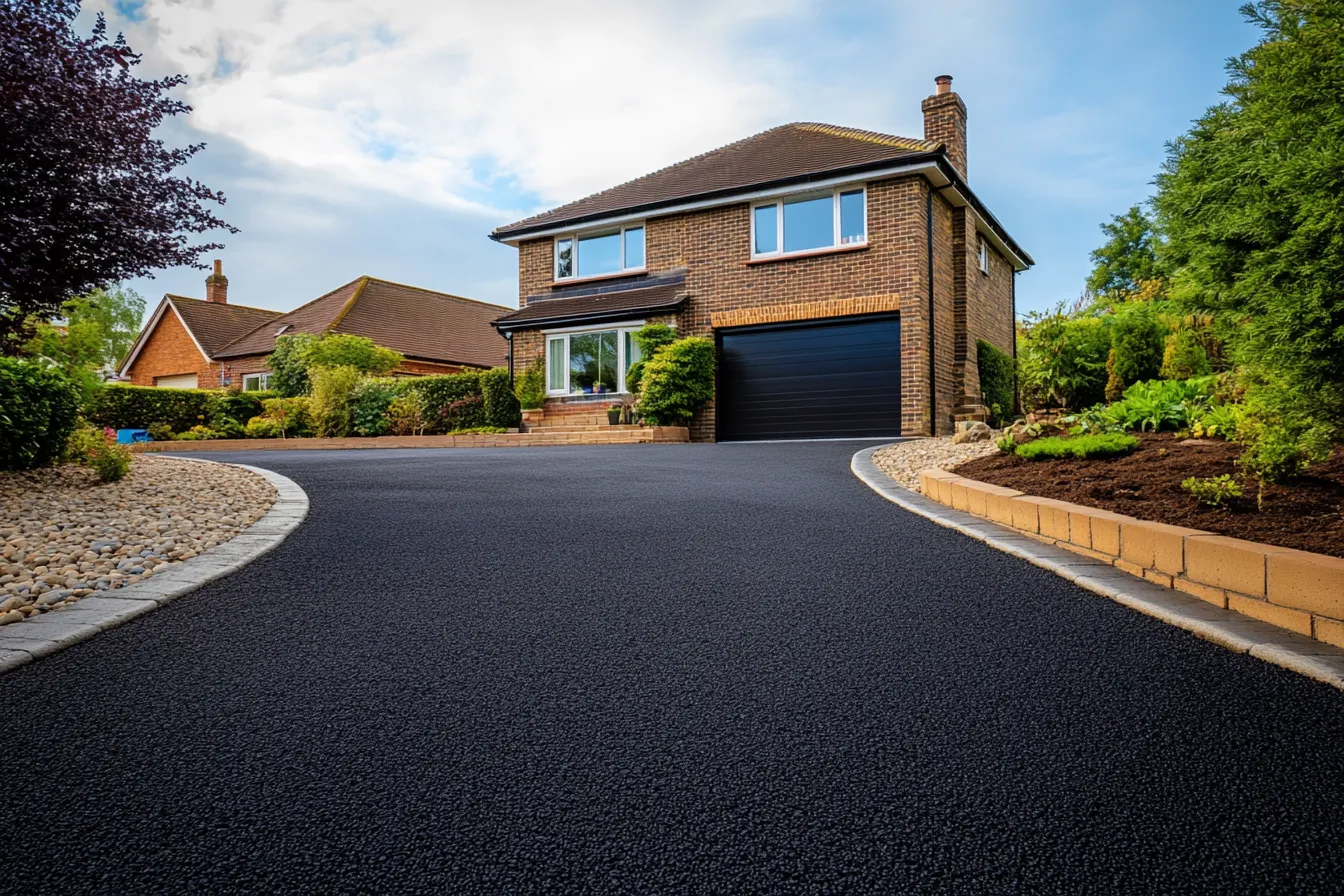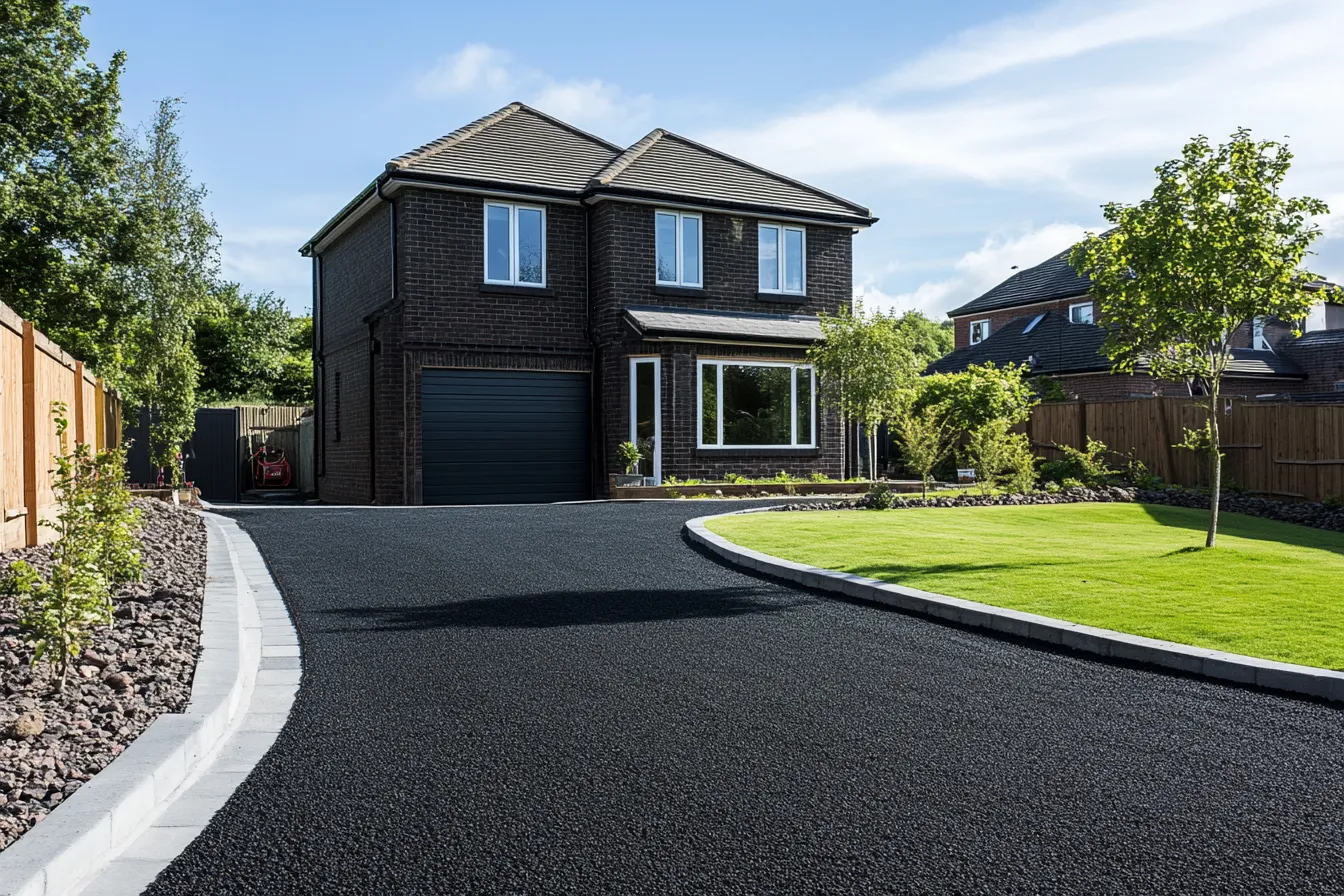Tarmac Driveway Cost: Ultimate UK Cost Guide [2025]

We may earn a commission on sales through links at no extra cost for you.
Are you thinking about installing a tarmac driveway? Take it from someone who’s been there – knowing what you’re getting into money-wise before starting the project can save you a ton of headaches. In this guide, I’ll walk you through everything you need to know about tarmac driveway cost in the UK and how to save money.
Key Takeaways
- Tarmac driveway costs in the UK typically range from £80 to £120 per m².
- The total price is influenced by factors such as driveway size, existing surface condition, location, drainage requirements, and additional features.
- A medium-sized tarmac driveway (50m²) costs between £4,000 and £6,000 on average.
- Professional installation is recommended due to the specialised equipment and expertise required.
- With proper maintenance, a tarmac driveway can last 15-20 years.
- Most tarmac driveway installations don’t require planning permission, but it’s always best to check with your local council.
What Affects Tarmac Driveway Costs?
Several factors influence the cost of a tarmac driveway:
- Size: The larger the area, the more materials and labour required.
- Current surface condition: Removing an existing driveway or dealing with difficult ground conditions can increase costs.
- Location: Prices vary across different regions in the UK.
- Access to the Site: If your property is difficult to access, it may require additional labor or specialized equipment, increasing costs.
- Drainage requirements: Proper drainage is vital and may add to the overall cost.
- Additional features: Kerbs, edging, or patterns will increase the price.
🫰 Breakdown: Average Tarmac Driveway Costs in the UK
When planning your tarmac driveway, it’s helpful to understand how the costs break down. Here’s what you can expect to pay on average per square metre for a 40 m² driveway:
- Excavation and soil disposal: £20 – £25 per m²
- Substructure: £15 – £25 per m²
- Drainage: £500 – £1,000 for a soakaway system
- Tarmac material: £40 – £50 per m²
- Labor cost: £150 – £200 per day (2-3 days for a 40 m² driveway)
This brings the total to around £100 – £120 per square metre for a complete installation. Keep in mind that these are average figures and can vary depending on your specific circumstances.
Cost Example: Tarmac Driveway Cost - 40 m²
| Overview | Per m² | 40 m² |
|---|---|---|
| Excavation and soil disposal | £20 | £800 |
| Substructure (gravel) | £20 | £800 |
| Drainage system | - | £500 |
| Tarmac (black) | £45 | £1,800 |
| Labor (3 days) | - | £500 |
| Total Cost | £110 | £4,400 |
Additional Costs to Consider
When budgeting for your tarmac driveway, keep these potential extra costs in mind:
- Edging: £15 – £30 per linear metre for kerb stones.
- Patterns or colours: 10-40% extra for decorative finishes.
The Larger the Tarmac Driveway, the Lower the Price per m²
Interestingly, the size of your driveway can significantly affect the price per square metre. Here’s how it typically breaks down. Keep in mind, these are just average figures and can of course vary:
| Size | Per m² | Total |
|---|---|---|
| Small - 25 m² | £120 | £3,000 |
| Medium - 50 m² | £100 | £5,000 |
| Large - 100 m² | £80 | £8,000 |
As you can see, there’s often a decrease in cost per square metre as the driveway size increases. This is due to economies of scale – larger projects can be more efficient in terms of labour and material use.
I found these figures really helpful when planning my own driveway. They helped me understand why quotes can vary so much and allowed me to budget more accurately.
Just keep in mind that while these numbers are a good starting point, it’s still worth getting a few quotes from local contractors. They’ll be able to give you a more accurate price based on your specific situation.
Labor Costs and Type of Tarmac
I’ve found that labor costs make up a big chunk of your tarmac driveway bill. Skilled workers need to prep the ground, lay the tarmac, and finish it off nicely. This takes time and know-how.
For materials, we’re looking at the tarmac itself, plus things like sand and gravel for the base. The type of tarmac you choose can also really impact your driveway costs.
There’s standard black tarmac, which is the cheapest option. But you might fancy coloured tarmac for a unique look – it costs more, though. Red is popular and can add about 40% to your bill. If you want a smoother finish, you’ll need to pay extra for a finer grade of tarmac.
Cost Comparison: Tarmac vs Other Materials
To help you make an informed decision, let’s compare tarmac with other popular driveway materials, including their pros and cons. As you will see, tarmac sits in the mid-range for pricing. It offers a good balance between cost and durability:
| Surface | Cost / m² | Pros | Cons |
|---|---|---|---|
| Tarmac | £80-£120 |
|
|
| Block Paving | £90-£180 |
|
|
| Resin-Bound | £100-£200 |
|
|
| Gravel | £40-£80 |
|
|
DIY vs Professional Installation
While Do It Yourself might seem tempting to save money, I strongly recommend professional installation for tarmac driveways. Here’s why:
- Specialised equipment: Tarmac laying requires heavy machinery not readily available to homeowners.
- Expertise: Proper installation ensures longevity and performance.
- Time-sensitive: Tarmac needs to be laid quickly while hot.
- Guaranteed results: Professionals offer warranties on their work.
The cost difference between DIY and professional installation isn’t as significant as you might think when you factor in equipment hire and potential mistakes.

The Installation Process
Understanding the installation process can help you appreciate the costs involved:
- Site Preparation: This involves excavating the area, removing old surfaces, and ensuring proper drainage.
- Base Layer: A sub-base of crushed stone is laid and compacted to provide a stable foundation.
- Binder Course: This layer of coarser tarmac is applied to further stabilize the surface.
- Surface Course: The final layer of fine tarmac is applied, creating a smooth, durable surface.
- Compaction: The entire surface is compacted to ensure strength and longevity.
- Finishing Touches: This may include edging, line marking, or sealing, depending on your specific requirements.
🕒 How long does it take to install a tarmac driveway?
The time required to install a tarmac driveway depends on various factors:
- Removal of existing vegetation
- Driveway size and shape
- Depth of excavation needed
- Drainage requirements
- Weather conditions
- Number of workers on site
For an average 50 sqm driveway, you’re looking at about 2-3 days for completion. Typically, the first two days involve preparation work (excavation, drainage, substructure), with the actual tarmac laying happening on the third day.
Larger projects might take up to a week or more. It’s always best to discuss the timeline with your chosen contractor to set realistic expectations.
Benefits of Choosing a Tarmac Driveway
Tarmac is a popular choice for UK driveways. It’s made from crushed stone mixed with tar, creating a durable and smooth surface. But why choose tarmac? Let’s take a look at the benefits of tarmac:
- Durability: Tarmac can last up to 20 years with proper maintenance.
- Quick installation: Often completed in just a few days.
- Low maintenance: Requires minimal upkeep compared to other materials.
- Weatherproof: Resistant to frost and suitable for the UK climate.
- Smooth finish: Ideal for parking and driving on.
Maintaining Your Tarmac Driveway
To get the most value from your investment, proper maintenance is key:
- Regular cleaning: Sweep and hose down the driveway to prevent staining.
- Seal coating: Apply every 3-5 years to protect the surface (£3 – £5 per m²).
- Crack repair: Address small cracks promptly to prevent water ingress.
- Avoid chemical spills: Oil and fuel can damage tarmac surfaces.
By following these steps, you can extend the life of your driveway and maintain its appearance.
6 Money Saving Tips to reduce your Tarmac Driveway Cost
- Get Multiple Quotes: Always obtain at least three quotes from reputable contractors to ensure you’re getting a fair price.
- Consider Timing: Some contractors offer off-season discounts, so consider planning your installation during less busy periods.
- Prepare the Site: If possible, do some of the preparatory work yourself, such as removing old surfaces or vegetation, to reduce labor costs.
- Opt for Standard Colors: While colored tarmac can be attractive, it often comes at a premium. Standard black tarmac is usually the most cost-effective option.
- Plan for the Long Term: Investing in proper drainage and a solid base may cost more upfront but can save you money on repairs and replacements in the future.
- Group with neighbours: If multiple houses in your area need driveway work, consider approaching contractors as a group. Bulk discounts could lead to significant savings.
Choosing a Reputable Contractor
To ensure you get the best value, follow these tips when selecting a contractor:
- Get at least three quotes for comparison.
- Check for memberships in trade associations like the National Highways Sector Scheme.
- Ask for references and examples of previous work.
- Ensure all job details are clearly outlined in a written contract.
- Never pay the full amount upfront – a deposit followed by payment upon completion is standard.
🌿 Environmental Considerations
As someone who cares about the environment, I looked into eco-friendly options:
- Porous Tarmac: Allows water to drain through, reducing runoff.
- Recycled Materials: Some contractors use recycled aggregates in their mix.
- Light Colours: Choosing a lighter shade can help reduce heat absorption.
While not the most eco-friendly option overall, these choices can make tarmac a more sustainable choice.
FAQs
Q: How long does a tarmac driveway last? A: With proper maintenance, a tarmac driveway can last 15-20 years.
Q: Can I install a tarmac driveway over an existing surface? A: It depends on the condition of the existing surface. In some cases, it’s possible to overlay tarmac, but often, complete removal and preparation of the base are necessary for the best results.
Q: How soon can I use my new tarmac driveway? A: Typically, you can walk on it after 24 hours and drive on it after 3-5 days, depending on weather conditions.
Q: Is tarmac environmentally friendly? A: While not the most eco-friendly option, newer porous tarmac mixes and the use of recycled materials can make it a more sustainable choice.
Q: Can tarmac be coloured? A: Yes, tarmac can be coloured, although colour options are more limited compared to other materials like concrete or block paving.
Conclusion
I hope you now have a clearer picture of what to expect in terms of costs, installation, and maintenance. Tarmac remains a popular choice for UK homeowners due to its durability, cost-effectiveness for larger areas, and relatively straightforward installation process.
Remember, while price is important, it shouldn’t be the only factor in your decision. Consider the long-term benefits, durability, and maintenance requirements when making your choice. With proper installation and care, a tarmac driveway can serve you well for many years to come.
If you’re ready to take the next step, start by getting quotes from reputable contractors in your area. And don’t forget to check with your local council regarding any necessary permissions before you begin. Happy driveway planning!
Frank is a journalist and home improvement enthusiast who recently bought and renovated his own house. After several challenges and discovering how tricky it can be to find reliable cost information, he decided to share his experiences through practical cost guides.